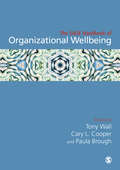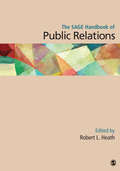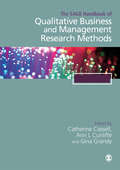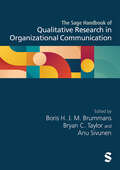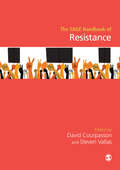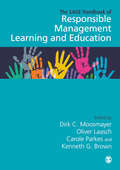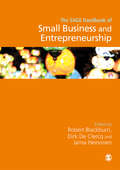- Table View
- List View
The SAGE Handbook of Organizational Institutionalism
by Roy Suddaby Royston Greenwood Christine Oliver Kerstin Sahlin-AnderssonInstitutional theory lies at the heart of organizational theory yet until now, no book has successfully taken stock of this important and wide-ranging theoretical perspective. With insight and clarity, the editors of this handbook have collected and arranged papers so readers are provided with a map of the field and pointed in the direction of new and emerging themes. The academics who have contributed to this handbook are respected internationally and represent a cross-section of expert organization theorists, sociologists and political scientists. Chapters are a rich mix of theory, how to conduct institutional organizational analysis and empirical work. The SAGE Handbook of Organizational Institutionalism will change how researchers, teachers and advanced students think about organizational institutionalism.
The SAGE Handbook of Organizational Wellbeing
by Cary L. Cooper Tony Wall Paula BroughThe SAGE Handbook of Organizational Wellbeing is a comprehensive and cutting-edge work providing the latest insights into a range of perspectives on organizational wellbeing, as well as highlighting global wellbeing issues and exploring new contexts. Topics covered include: digital working and social media, LGBTQIA+ identifications and work, suicide at work, refugee workers, and mental health. A multi- and inter-disciplinary work, this handbook embraces ideas and empirical work from a range of fields including psychology, business and management, economics, and science. This handbook draws together current knowledge whilst also outlining emerging issues and directions, making this an invaluable resource for students and researchers spanning a wide array of disciplines. Part 1: Theoretical Perspectives Part 2: International Issues and Contexts Part 3: Developing Organizational Wellbeing Part 4: Emerging Issues and Directions
The SAGE Handbook of Organizational Wellbeing
by Cary L. Cooper Tony Wall Paula BroughThe SAGE Handbook of Organizational Wellbeing is a comprehensive and cutting-edge work providing the latest insights into a range of perspectives on organizational wellbeing, as well as highlighting global wellbeing issues and exploring new contexts. Topics covered include: digital working and social media, LGBTQIA+ identifications and work, suicide at work, refugee workers, and mental health. A multi- and inter-disciplinary work, this handbook embraces ideas and empirical work from a range of fields including psychology, business and management, economics, and science. This handbook draws together current knowledge whilst also outlining emerging issues and directions, making this an invaluable resource for students and researchers spanning a wide array of disciplines. Part 1: Theoretical Perspectives Part 2: International Issues and Contexts Part 3: Developing Organizational Wellbeing Part 4: Emerging Issues and Directions
The SAGE Handbook of Process Organization Studies
by Ann Langley Haridimos TsoukasThe SAGE Handbook of Process Organization Studies provides a comprehensive and timely overview of the field. This volume offers a compendium of perspectives on process thinking, process organizational theory, process research methodology and empirical applications. The emphasis is on a combination of pedagogical contributions and in-depth reviews of current thinking and research in each of the selected areas, combined with the development of agendas for future research. The Handbook is divided into five sections: Part One: Process Philosophy Part Two: Process Theory Part Three: Process Methodology Part Four: Process Applications Part Five: Process Perspectives
The SAGE Handbook of Process Organization Studies
by Ann Langley Haridimos TsoukasThe SAGE Handbook of Process Organization Studies provides a comprehensive and timely overview of the field. This volume offers a compendium of perspectives on process thinking, process organizational theory, process research methodology and empirical applications. The emphasis is on a combination of pedagogical contributions and in-depth reviews of current thinking and research in each of the selected areas, combined with the development of agendas for future research. The Handbook is divided into five sections: Part One: Process Philosophy Part Two: Process Theory Part Three: Process Methodology Part Four: Process Applications Part Five: Process Perspectives
The SAGE Handbook of Public Relations
by Robert L. HeathAn unparalleled guide to the theory and practice of public relationsReflecting advances in theory, research, and application in the discipline since the publication of the Handbook of Public Relations in 2001, this new volume is global in scope and unmatched in its coverage of both academic research and professional best practice. Key FeaturesPresents major theories in the words of the leading advocates for each theoryCovers the full range of theory, research, and practice in the disciplinePositions public relations as a positive force to help make society more fully functionalChallenges academics and practitioners to identify best practices that can inform the work of those in the profession
The SAGE Handbook of Qualitative Business and Management Research Methods
by Catherine Cassell Ann L. Cunliffe Gina GrandyThe SAGE Handbook of Qualitative Business and Management Research Methods provides a state-of–the-art overview of qualitative research methods in the business and management field. The Handbook celebrates the diversity of the field by drawing from a wide range of traditions and by bringing together a number of leading international researchers engaged in studying a variety of topics through multiple qualitative methods. The chapters address the philosophical underpinnings of particular approaches to research, contemporary illustrations, references, and practical guidelines for their use. The two volumes therefore provide a useful resource for Ph.D. students and early career researchers interested in developing and expanding their knowledge and practice of qualitative research. In covering established and emerging methods, it also provides an invaluable source of information for faculty teaching qualitative research methods. The contents of the Handbook are arranged into two volumes covering seven key themes: Volume One: History and Tradition Part One: Influential Traditions: underpinning qualitative research: positivism, interpretivism, pragmatism, constructionism, critical, poststructuralism, hermeneutics, postcolonialism, critical realism, mixed methods, grounded theory, feminist and indigenous approaches. Part Two: Research Designs: ethnography, field research, action research, case studies, process and practice methodologies. Part Three: The Researcher: positionality, reflexivity, ethics, gender and intersectionality, writing from the body, and achieving critical distance. Part Four: Challenges: research design, access and departure, choosing participants, research across boundaries, writing for different audiences, ethics in international research, digital ethics, and publishing qualitative research. Volume Two: Methods and Challenges Part One: Contemporary methods: interviews, archival analysis, autoethnography, rhetoric, historical, stories and narratives, discourse analysis, group methods, sociomateriality, fiction, metaphors, dramaturgy, diary, shadowing and thematic analysis. Part Two: Visual methods: photographs, drawing, video, web images, semiotics and symbols, collages, documentaries. Part Three: Methodological developments: aesthetics and smell, fuzzy set comparative analysis, sewing quilts, netnography, ethnomusicality, software, ANTI-history, emotion, and pattern matching.
The SAGE Handbook of Qualitative Business and Management Research Methods: Methods and Challenges
by Ann L Cunliffe Professor Cathy Cassell Dr Gina GrandyThe SAGE Handbook of Qualitative Business and Management Research Methods provides a state-of–the art overview of qualitative research methods in the business and management field. Bringing together a team of leading international researchers, the chapters offer a comprehensive overview of the key methods and challenges encountered when undertaking qualitative research in the field. The chapters have been arranged into three thematic parts: Part One examines a broad spectrum of contemporary methods, from autoethnography and discourse analysis, to shadowing and thematic analysis. Part Two presents an overview of key visual methods, such as photographs, drawing, video and web images. Part Three explores methodological developments, including aesthetics and smell, fuzzy set comparative analysis, and beyond.
The SAGE Handbook of Qualitative Business and Management Research Methods: History and Traditions
by Ann L Cunliffe Professor Cathy Cassell Dr Gina GrandyThe SAGE Handbook of Qualitative Business and Management Research Methods provides a state-of–the art overview of qualitative research methods in the business and management field. Bringing together a team of leading international researchers, the chapters offer a comprehensive overview of the history and traditions that underpin qualitative research in the field. The chapters in this volume have been arranged into four thematic parts: Part One explores the influential traditions underpinning qualitative research, such as positivism, interpretivism, pragmatism, constructionism and beyond. Part Two looks at research designs, covering ethnography, field research, action research, case studies, process and practice methodologies. Part Three focusses on the researcher: examining issues such as positionality, reflexivity, ethics, gender and intersectionality. Part Four examines challenges relating to research design, access and departure, choosing participants and more.
The SAGE Handbook of Qualitative Business and Management Research Methods: History and Traditions
by Dr Gina Grandy Professor Cathy Cassell Ann L CunliffeThe SAGE Handbook of Qualitative Business and Management Research Methods provides a state-of–the art overview of qualitative research methods in the business and management field. Bringing together a team of leading international researchers, the chapters offer a comprehensive overview of the history and traditions that underpin qualitative research in the field. The chapters in this volume have been arranged into four thematic parts: Part One explores the influential traditions underpinning qualitative research, such as positivism, interpretivism, pragmatism, constructionism and beyond. Part Two looks at research designs, covering ethnography, field research, action research, case studies, process and practice methodologies. Part Three focusses on the researcher: examining issues such as positionality, reflexivity, ethics, gender and intersectionality. Part Four examines challenges relating to research design, access and departure, choosing participants and more.
The SAGE Handbook of Qualitative Business and Management Research Methods: Methods and Challenges
by Dr Gina Grandy Professor Cathy Cassell Ann L CunliffeThe SAGE Handbook of Qualitative Business and Management Research Methods provides a state-of–the art overview of qualitative research methods in the business and management field. Bringing together a team of leading international researchers, the chapters offer a comprehensive overview of the key methods and challenges encountered when undertaking qualitative research in the field. The chapters have been arranged into three thematic parts: Part One examines a broad spectrum of contemporary methods, from autoethnography and discourse analysis, to shadowing and thematic analysis. Part Two presents an overview of key visual methods, such as photographs, drawing, video and web images. Part Three explores methodological developments, including aesthetics and smell, fuzzy set comparative analysis, and beyond.
The Sage Handbook of Qualitative Research in Organizational Communication
by Boris H. J. M. Brummans Bryan C. Taylor Anu SivunenThe Sage Handbook of Qualitative Research in Organizational Communication is a state-of-the-art resource for scholars, students, and practitioners seeking to deepen their understanding and expertise in this dynamic field. Written by a global team of established and emerging experts, this Handbook provides a comprehensive exploration of the field’s foundational traditions of epistemology and theory, as well as its latest methodologies, methods, issues, and debates. The volume reflects a diverse range of approaches (e.g., mixed-methods, ethnographic, rhetorical, pragmatist, phenomenological, feminist, critical race, postcolonial, queer, and engaged), and covers a broad spectrum of topics ranging from data collection and analysis, to representation. Additionally, this Handbook addresses emerging trends such as digital forensics, post-qualitative research, and the transformative impact of COVID-19 on the conduct of qualitative research in organizational communication. As the first volume of its kind in this field, The Sage Handbook of Qualitative Research in Organizational Communication is a cornerstone text for scholars, students, and practitioners interested in understanding the vital role of communication in organizational life. Part 1: Approaches to Qualitative Organizational Communication Research Part 2: Data Collection in Qualitative Organizational Communication Research: Methods and Issues Part 3: Data Analysis and Representation in Qualitative Organizational Communication Research: Methods and Issues Part 4: The Future of Qualitative Organizational Communication Research
The Sage Handbook of Qualitative Research in Organizational Communication
by Boris H. J. M. Brummans Bryan C. Taylor Anu SivunenThe Sage Handbook of Qualitative Research in Organizational Communication is a state-of-the-art resource for scholars, students, and practitioners seeking to deepen their understanding and expertise in this dynamic field. Written by a global team of established and emerging experts, this Handbook provides a comprehensive exploration of the field’s foundational traditions of epistemology and theory, as well as its latest methodologies, methods, issues, and debates. The volume reflects a diverse range of approaches (e.g., mixed-methods, ethnographic, rhetorical, pragmatist, phenomenological, feminist, critical race, postcolonial, queer, and engaged), and covers a broad spectrum of topics ranging from data collection and analysis, to representation. Additionally, this Handbook addresses emerging trends such as digital forensics, post-qualitative research, and the transformative impact of COVID-19 on the conduct of qualitative research in organizational communication. As the first volume of its kind in this field, The Sage Handbook of Qualitative Research in Organizational Communication is a cornerstone text for scholars, students, and practitioners interested in understanding the vital role of communication in organizational life. Part 1: Approaches to Qualitative Organizational Communication Research Part 2: Data Collection in Qualitative Organizational Communication Research: Methods and Issues Part 3: Data Analysis and Representation in Qualitative Organizational Communication Research: Methods and Issues Part 4: The Future of Qualitative Organizational Communication Research
The SAGE Handbook of Resistance
by David Courpasson Steven VallasOccupy. Indignados. The Tea Party. The Arab Spring. Anonymous. These and other terms have become part of an emerging lexicon in recent years, signalling an important development that has gripped many parts of the world: millions of people are increasingly involved, whether directly or indirectly, in movements of resistance and protestation. However, resistance and its conceptual "companions", protest, contestation, opposition, disobedience and mobilization, all seem to be still mostly seen in public and private discourses as illegitimate and problematic forms of action. The time is, therefore, ripe to delve into the concerns, themes and legitimacy. The SAGE Handbook of Resistance offers theoretical essays enabling readers to forge their own perspectives of what "is" resistance and emphasizes the empirical and experiential dimension of resistance - making strong choices in terms of how contemporary topics related to resistance help to rethink our societies as "protest societies". The coverage is divided into six key sub-sections: Foundations Sites of Resistance Technologies of Resistance Languages of Resistance Geographies of Resistance Consequences of Resistance
The SAGE Handbook of Resistance
by David Courpasson Steven VallasChosen by Library Journal as one of the best reference texts of 2016. Occupy. Indignados. The Tea Party. The Arab Spring. Anonymous. These and other terms have become part of an emerging lexicon in recent years, signalling an important development that has gripped many parts of the world: millions of people are increasingly involved, whether directly or indirectly, in movements of resistance and protestation. However, resistance and its conceptual "companions”, protest, contestation, opposition, disobedience and mobilization, all seem to be still mostly seen in public and private discourses as illegitimate and problematic forms of action. The time is, therefore, ripe to delve into the concerns, themes and legitimacy. The SAGE Handbook of Resistance offers theoretical essays enabling readers to forge their own perspectives of what “is” resistance and emphasizes the empirical and experiential dimension of resistance - making strong choices in terms of how contemporary topics related to resistance help to rethink our societies as “protest societies”. The coverage is divided into six key sub-sections: Foundations Sites of Resistance Technologies of Resistance Languages of Resistance Geographies of Resistance Consequences of Resistance
The SAGE Handbook of Responsible Management Learning and Education
by Kenneth G. Brown Oliver Laasch Carole Parkes Dirk MoosmayerReflecting the rapid rise in popularity of recent initiatives such as the UN Principles for Responsible Management Education (PRME), this handbook exhaustively covers a variety of responsible management, learning and education topics, and provides an invaluable roadmap for this fast-developing field. Covering various perspectives on the topic, right through to contexts, methods, outcomes and beyond, this volume will be an invaluable integrative resource for practitioners and researchers alike, and is designed to serve a range of communities that deal with topics related to sustainability, responsibility and ethics in management learning and education.
The SAGE Handbook of Responsible Management Learning and Education
by Kenneth G. Brown Oliver Laasch Carole Parkes Dirk MoosmayerReflecting the rapid rise in popularity of recent initiatives such as the UN Principles for Responsible Management Education (PRME), this handbook exhaustively covers a variety of responsible management, learning and education topics, and provides an invaluable roadmap for this fast-developing field. Covering various perspectives on the topic, right through to contexts, methods, outcomes and beyond, this volume will be an invaluable integrative resource for practitioners and researchers alike, and is designed to serve a range of communities that deal with topics related to sustainability, responsibility and ethics in management learning and education.
The SAGE Handbook of Small Business and Entrepreneurship
by Robert Blackburn Dr Dirk De Clercq Jarna HeinonenThe SAGE Handbook of Small Business and Entrepreneurship offers state-of-the-art chapters on all aspects of this rapidly-evolving discipline. Original contributions from the best international scholars map the development of Entrepreneurship as an academic field, explore its key current debates and research methods, and also consider its future directions. Part One: The People and the Entrepreneurial Processes Part Two: Entrepreneurship and Small Business Management and Organization Part Three: Entrepreneurial Milieu Part Four: Researching Small Business Entrepreneurship This handbook will be the leading reference book for Entrepreneurship academics and researchers, as well as those from other associated disciplines including business and management, psychology, marketing, sociology and anthropology.
The SAGE Handbook of Small Business and Entrepreneurship
by Robert Blackburn Dr Dirk De Clercq Jarna HeinonenThe SAGE Handbook of Small Business and Entrepreneurship offers state-of-the-art chapters on all aspects of this rapidly-evolving discipline. Original contributions from the best international scholars map the development of Entrepreneurship as an academic field, explore its key current debates and research methods, and also consider its future directions. Part One: The People and the Entrepreneurial Processes Part Two: Entrepreneurship and Small Business Management and Organization Part Three: Entrepreneurial Milieu Part Four: Researching Small Business Entrepreneurship This handbook will be the leading reference book for Entrepreneurship academics and researchers, as well as those from other associated disciplines including business and management, psychology, marketing, sociology and anthropology.
The SAGE Handbook of Social Marketing
by Kathryn Angus Gerard Hastings Carol A. BryantFor the first time, this benchmark handbook brings together a systematic framework and state-of-the-art thinking to provide complete coverage of the social marketing discipline. It presents a major retrospective and prospective overview of social marketing, helping to define and shape its current and future developments by: - examining the defining elements of social marketing, their intellectual origins, evolution, current status and direction of travel; - discussing how these have been used in practice, emphasising emerging areas and recent innovations; and - setting the agenda for future research and development in the discipline. For academics, this book will fill the gap in comprehensive social marketing literature, while being of interest to policymakers and post-graduate marketing and health studies students alike as it explores the idea that tools used to market fast-moving consumer goods and financial services can also be applied to pressing social problems.
The SAGE Handbook of Social Media Marketing
by Annmarie Hanlon Tracy L. TutenSocial media marketing has become indispensable for marketers who utilize social media to achieve marketing objectives ranging from customer care to advertising to commerce. This Handbook explores the foundations and methodologies in analysing the important aspects of social media for organisations and consumers. It investigates critical areas concerning communities, culture, communication and content, and considers social media sales. This Handbook brings together the critical factors in social media marketing as the essential reference set for researchers in this area of continued growth. It is essential reading for postgraduate students, researchers, and practitioners in a range of disciplines exploring the area. Part 1: Foundations of Social Media Marketing Part 2: Methodologies and Theories in Social Media Part 3: Channels and Platforms in Social Media Part 4: Tools, Tactics, and Techniques in Social Media Marketing Part 5: Management and Metrics in Social Media Part 6: Ethical Issues in Social Media
The SAGE Handbook of Social Media Marketing
by Annmarie Hanlon Tracy L. TutenSocial media marketing has become indispensable for marketers who utilize social media to achieve marketing objectives ranging from customer care to advertising to commerce. This Handbook explores the foundations and methodologies in analysing the important aspects of social media for organisations and consumers. It investigates critical areas concerning communities, culture, communication and content, and considers social media sales. This Handbook brings together the critical factors in social media marketing as the essential reference set for researchers in this area of continued growth. It is essential reading for postgraduate students, researchers, and practitioners in a range of disciplines exploring the area. Part 1: Foundations of Social Media Marketing Part 2: Methodologies and Theories in Social Media Part 3: Channels and Platforms in Social Media Part 4: Tools, Tactics, and Techniques in Social Media Marketing Part 5: Management and Metrics in Social Media Part 6: Ethical Issues in Social Media
The SAGE Handbook of Sport Management
by Russell Hoye Milena M. ParentThe SAGE Handbook of Sport Management draws together the best current research on the major topics relevant to the field of sports management, including leadership, gender, diversity, development, policy, tourism, and media. Edited by two of the most respected figures in the field, the handbook includes contributions from leading sport management academics from Australia, Canada, New Zealand, USA, the UK and Europe. The key themes and debates of sport management are organized across three sections: sport management fundamentals and key concepts sport management challenges and issues sport management futures.
The SAGE Handbook of Sport Management
by Russell Hoye Milena M. ParentThe SAGE Handbook of Sport Management draws together the best current research on the major topics relevant to the field of sports management, including leadership, gender, diversity, development, policy, tourism, and media. Edited by two of the most respected figures in the field, the handbook includes contributions from leading sport management academics from Australia, Canada, New Zealand, USA, the UK and Europe.
The SAGE Handbook of Sports Economics
by Tim Pawlowski Bernd Frick Paul Downward Brad R. Humphreys Jane E. Ruseski Brian P. SoebbingSports economics is a well-established and dynamic area of study; a key component in the fields of sport management, sport science and sport studies, as well as in other areas of economics, finance and management. Covering amateur to professional sports, individual events and organised tournaments, this Handbook provides an authoritative contribution to the understanding of sport in the economy. The editors of The SAGE Handbook of Sports Economics have brought together a global team of respected scholars to create this benchmark collection of insights into sports economics. Each chapter includes a study of a specific context in which issues arise in sports economics, a critical presentation of its main theoretical contributions, an overview of current research findings, and an outline of enquiry for future research. PART I: The Nature and Value of the Sports System and Economy PART II: Amateur Sports Participation, Supply and Impact PART III: Professional Team Sports PART IV: Professional Sports Leagues PART V: Sports Events and their Impacts PART VI: Individual Sports PART VII: Future Research

